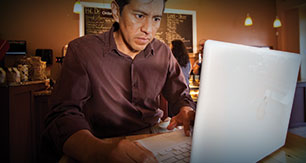
When it comes to isolated or unreached communities who haven’t heard the Gospel message, we often think of indigenous people in remote areas. Yet, there’s a largely overlooked group in need of the hope of Christ: the deaf community.
“This is one of the largest unreached people groups in the world,” explained Gail Markovich, an American Sign Language (ASL)-proficient associate at the Billy Graham Evangelistic Association.
“And they’re right here. They’re right in our community. You don’t have to go halfway around the world to a remote area. They’re right where you live.”
Of the world’s 70 million deaf people, it’s estimated less than two percent know and follow Jesus. In response, the Billy Graham Evangelistic Association (BGEA) is now expanding its internet evangelism ministry Search for Jesus (SFJ) to include outreach to the deaf community. ASL is used in 14 countries around the world, including the U.S. and Canada.
The new ASL ministry launched last November with a Facebook page called ASL by the Light, where deaf visitors can see the Gospel message explained and have their spiritual questions answered via Facebook Messenger.
“We want to be a place that puts ASL first. We hope to build a community where there’s [content] for the deaf from the deaf,” Markovich said.
A Growing Need
The hearing world tends to misunderstand the deaf community and the barriers they face.
More than 90 percent of deaf children are born to hearing parents, yet most of these parents do not learn ASL. It’s also important to note ASL is not English, and not all deaf people read English well. This means closed captioning and lip reading aren’t the most effective ways to communicate with deaf individuals.
“You have to ask, ‘What has been the problem? Why are people living in a country that’s advanced in so many ways—why haven’t they heard the Gospel?’
“It’s because of the language barrier,” Markovich said.
Markovich is proof of how the hearing world can make meaningful connections with the deaf community. She’s not deaf, nor does she have anyone deaf in her family. But an encounter as a little girl with a man asking for money at a bus station put her on the path she’s living out today.
“I went over and put some money in his area, and he gave me a card. On one side it had hand shapes and the alphabet—which I immediately went on to memorize. And on the other side it had information about himself [explaining that he’s deaf],” she recalled.
“When I looked at him, we spoke no words between us. … But his smile and my smile communicated so much,” Markovich continued. “I felt tremendously connected to him. That was huge.
“I knew then, even at 10, it was a very real communication.”
Fostering Online Community
One way churches and ministries can effectively reach deaf individuals is through video—and this is primarily how the ASL ministry will operate.
SFJ is in the process of recruiting volunteers who are deaf. This way, when a deaf visitor chooses to engage with content and wants to have further conversation about God and faith, they have a trained online coach they can relate to and connect with.
There are deaf volunteers currently going through online internet evangelism training, and the ministry is working alongside members of the local deaf community to contribute content to the ASL by the Light Facebook page.
“We really want the posts and responses to be in ASL. That’s what makes this different,” Markovich explained. “We desire to create a platform that will support video and have that conversation [in ASL].”
In addition to social media posts, Know Jesus—one of BGEA’s most popular resources for discipling new believers—is now being revamped in ASL.
“What would be best is if the material itself is presented in the target language, and that’s what we’ve done with Know Jesus ASL,” Markovich said.
“No matter what the language is, we want them plugged in,” she added, speaking to the overall goal of Peace With God, which has evangelistic websites available in several languages.
Also in the works is a church locator that will help the deaf community connect with a local church that is equipped to teach and guide them in the ways they need—and understand issues they may be facing.
“As with any language, you’ve also got culture that goes along with that. We’re also dealing with a subculture of American culture … there’s relationships that take time to form. But we’re very encouraged,” Markovich said.
How You Can Help
BGEA’s internet evangelism team is asking supporters to pray as this new endeavor continues to grow and develop.
“If you have any connections in the deaf community, if you know anyone or live in the same town as a deaf school. Or maybe you have a friend who is a speech therapist and that could be a link,” Markovich added.
“Think if there’s anyone in your sphere who may benefit from ASL by the Light [and tell them about it].”
You can also engage in online conversations on the ministry’s Facebook page and share the posts being made.


